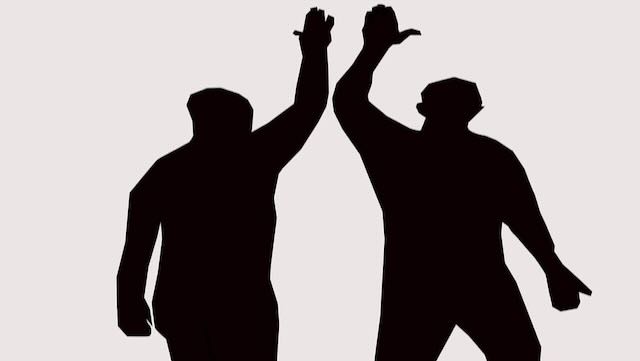
Several years ago I booked Phil Rosenthal as a guest on my radio show. In my introduction, I mentioned some of his credits, including that he’d been the showrunner on 180 episodes of “Everybody Loves Raymond.” But the first thing he did was correct me — he’d overseen all 210 episodes of the sitcom. I apologized for my mistake and we then had a great conversation. Afterwards, no one at the radio station, including my engineer and producer, felt the need to give me a high five.
But I see athletes do it all the time after something has gone wrong. When an NBA player misses a free throw, before he shoots his next one, all four teammates on the court go over and slap hands with him. I’ve seen doubles tennis partners do the same after one of them serves the ball into the net. I have witnessed NFL linemen go over and high five a teammate who missed a tackle on a running back, allowing him to score a touchdown.
In fact, it’s even worse in pro football because they don’t high five. Instead, they hit each other on the helmet, a practice that should have stopped years ago when concussions started getting more attention. Smack the guy on the back, or on his shoulder pads, not on the thing holding his brains together!
You don’t see this in other jobs. No car salesman gets fist bumps after not closing a new car deal. No waitress is congratulated by other servers after bringing a customer a cheeseburger when they ordered chicken parmigiana. No librarian gets a high five after filing all the Harry Potter books in the Latin American History section.
I’m not talking about youth sports where, after the game, both teams high five each other regardless of the final score. That’s a display of sportsmanship. But I’m talking about professionals. Adults. Are they worried that not getting a high five from a teammate means they no longer care about you? Talk about fragile egos.
I understand it’s a gesture of support, but that same action used to be congratulatory — you made the shot, you served an ace, you sacked the quarterback. Now it feels about as validating as a participation trophy.
Would you want your friends to give you a high five when you didn’t get a job you really wanted? Or when the bailiff is leading you away after a jury found you guilty? How about when you lost a big bet because that defensive lineman missed that tackle?
Previously on Harris Online…
- My conversation with Phil Rosenthal about his Netflix series, “Somebody Feed Phil” [1/9/18]
- My conversation with Phil Rosenthal about his PBS series, “I’ll Have What Phil’s Having” [9/26/15]
- My conversation with Phil Rosenthal about “Everybody Loves Raymond” and his book, “You’re Lucky You’re Funny” [10/31/06]
